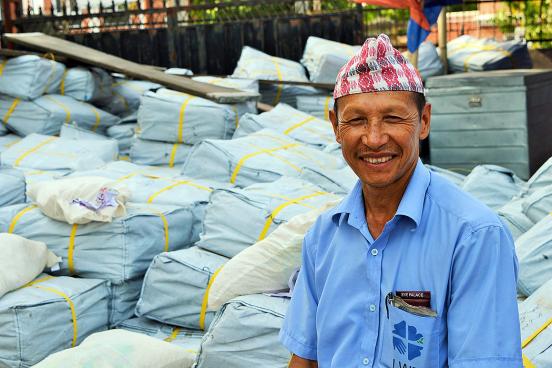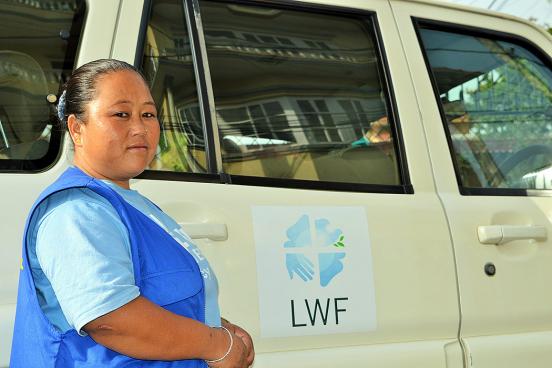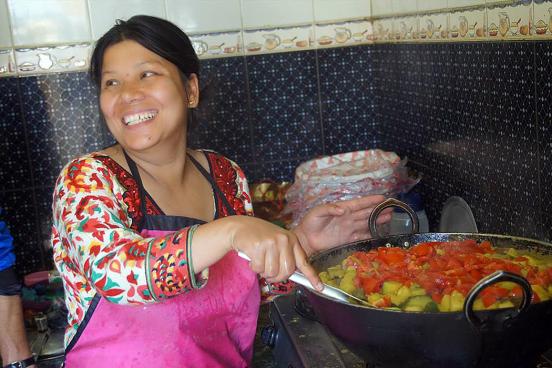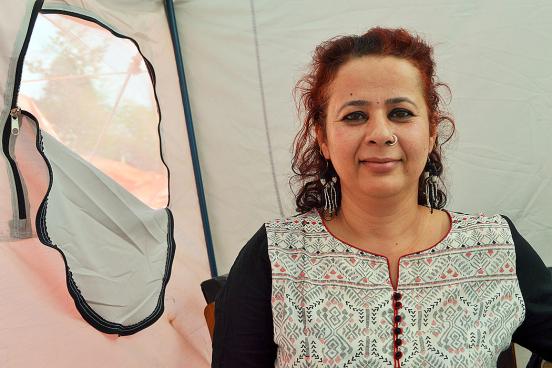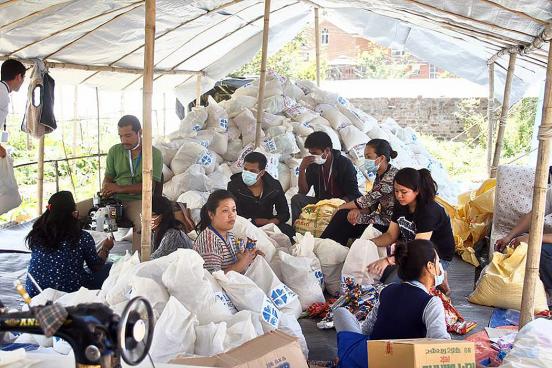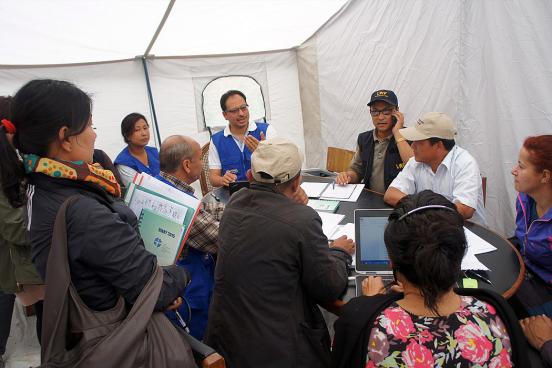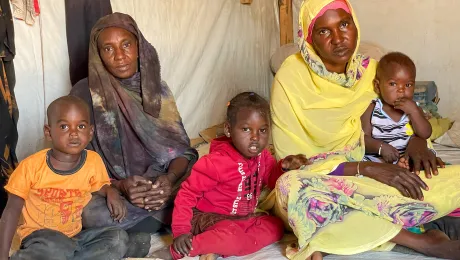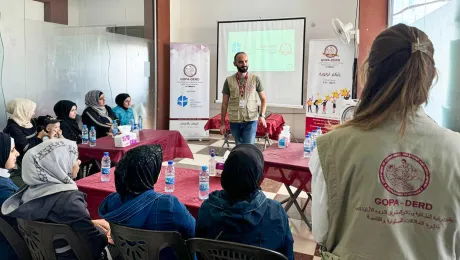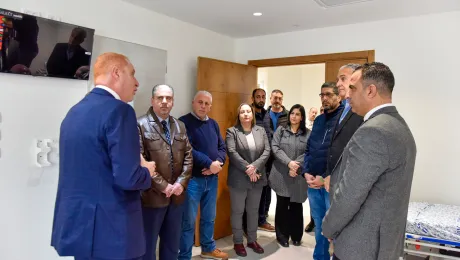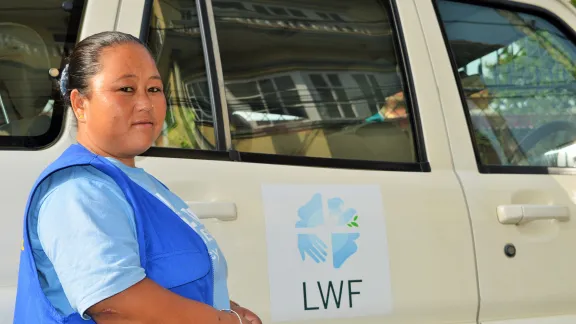
Driver Anita Rana Magar faced angry crowds and landsides during a relief mission. Photo: LWF/ L. de Vries
“This is the time when we can contribute”
KATHMANDU, Nepal/ GENEVA, 3 June 2015 (LWI) - When the magnitude 7.8 earthquake struck Nepal on Saturday 25 April 2015, shelves at The Lutheran World Federation (LWF) country office in Kathmandu tumbled over, leaving a trail of broken glass and files in disarray. The homes of four staff were completely destroyed while the houses of others were damaged. Some staff members lost contact with their loved ones and spend agonizing hours waiting for news. Yet they returned to the office to help others. Within hours of the earthquake, an emergency team was put together and made operational.
Amrit Sunwar, one of LWF Nepal’s eldest staff, was at a church service when the building started moving. “I remembered the lessons from an earthquake training and told the people to stay calm and leave the building only after the quake was over,” says Sunwar. The service continued outside, in an open field. What the finance assistant did not know then was that his home in Ramechap district, in eastern Nepal, had collapsed. Luckily his 80-year old parents were out working in the fields and escaped unscathed.
“Terrifying experience”
Kitchen helper Bishnu Maya Maharjan was busy washing clothes at her brother’s house when the earthquake struck. “It was a terrifying experience. I saw how my sister-in-law fell down holding my sixteen-month-old baby but I could not get to them. Only when the shaking stopped could I get to them. They were both ok. After that all I could do was cry.”
Maharjan had a narrow escape. Her own house, a traditional Newar home in the heart of Patan, Kathmandu district, collapsed. “Because we lack water in the old house I do the laundry at my brothers’ place on Saturdays. That saved us.”
Human resource officer Nisha Kharel was visiting her home district Chitwan on that fateful day. The quake had little impact there. Because she could not get hold of her family in Kathmandu she decided to drive back the next day. “When I entered Kathmandu Valley I started to cry. So much destruction. It slowly dawned on me that this was a big disaster.” Luckily her 70-year old mother survived the quake without a scratch. However, the apartment Kharel had just bought in a high rise building was heavily damaged.
“Providing relief is one of our main jobs”
The day after the earthquake, Sunwar paid a quick visit to his parents to help them build a temporary shelter. He then organized a tent for his wife and son in Kathmandu, as none of them felt safe to sleep in the rented room on the fourth floor. The next day he was back at work. “Providing relief is one of LWF’s main jobs. This is the time when we can truly contribute to the needy,” he argues.
Maharjan and her family now live in a tent along the Patan Ring Road. They have brought out the gas stove and utensils and cook out in the open. Although her brother’s house only sustained a few cracks none of the relatives dare to return to the place. Despite these difficult circumstances, Bishnu Maya was at the office again few days after the earthquake, cooking midday meals for up to 100 people. Her workload has doubled with the influx of hundreds of volunteers, new staff and visitors. But she does not mind. “Being here with my friends helps me to relax,” she says.
Kharel and her mother moved in with distant relatives and slept on the floor with 40 to 50 other people for a week. She was too scared to enter her apartment to retrieve her clothes. Yet, she sprang into action and helped LWF Nepal hire 18 new staff and recruit hundreds of volunteers. “For the first time in my life I felt I knew what it means to be a refugee,” she says.
Dangerous relief work
Although they are happy to be helping others, the staff are unable to forget their worries completely. Sunwar is concerned about his elderly parents. “Every morning I ask myself: How did they spend the night? What do they eat today?” he says. Kitchen helper Bishnu Maya calls her husband three times a day to check on the baby.
Kharel, a single parent, nowadays stays with her sister and has collected some essentials from her apartment. “Half of the time I still can’t believe what has happened. My mother bought this expensive flat for me, which now is basically uninhabitable. A huge investment has gone. However, I learn from the Bible that there are new beginnings. We hope against hope.”
The relief work is not without danger. Anita Rana Magar, a driver with LWF Nepal, experienced this first hand during a recent trip to Sindhupalchowk district, one of the worst affected districts east of Kathmandu. The convoy with relief goods was stopped by an angry mob who wanted to loot the material. “They threatened to overthrow the car and attack us,” recounts Magar. She quickly removed her LWF jacket and retorted: “These goods are for our friends in the next village. You cannot confiscate private goods.” The villagers retreated and the team stayed the night at a secure army camp.
The next day Magar faced an even greater challenge. During a strong aftershock rocks started tumbling down from the hills above the camp. “I was very scared. ‘We are going to die,’ I shouted. The army captain comforted me and said, ‘You will not die today’.” The landslides caved in on the army camp on both sides. There was no other choice but to leave the car behind and walk back to safety. During the long trek Magar injured her foot. She cried when the team reached the road head, where another LWF car was waiting for them.
“Every other job is easy”
Magar’s husband works abroad in Malaysia, which is why the young driver has to manage things on her own. But by now she has regained her confidence. “After what happened to me in Sindhupalchowk I feel every other job is easy. Nothing really compares to that dreadful experience.”
The disaster has created a strong bond among the LWF Nepal team. “We are more than family now,” says one of the team members.
Thanks to the dedication of the LWF Nepal team, more than 3,000 families were provided with life-saving relief in the week after the earthquake. To date, the LWF has distributed relief goods to 13,718 households in 27 towns and villages. LWF is assisting in six districts, namely Kathmandu, Lalitpur, Bhaktapur, Sindhupalchowk, Rasuwa and Dolakha.
ACT Alliance agencies – of which the LWF is a member – that work together as the ACT Nepal forum have provided emergency shelter kits, hygiene items, psychosocial counseling, food and non-food items to 51,868 households in nine districts in the Kathmandu valley and north-eastern Nepal.
(Contribution by Lucia de Vries, LWF Nepal)
Donate to the LWF Nepal emergency
Visit the Nepal earthquake response page, the Nepal program page and the Nepal program site
